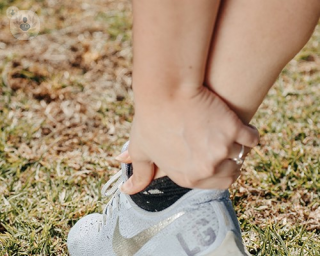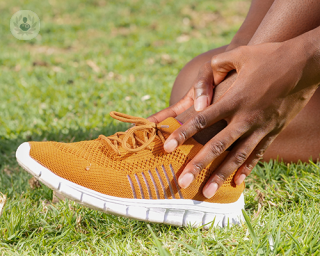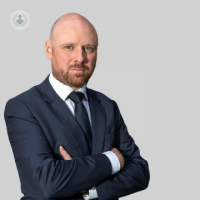What is ankle instability?
Ankle instability is a condition that occurs when the ankle joint is unable to support the body’s weight, leading to a feeling of instability and a fear of rolling the ankle.

What causes ankle instability?
This condition can be caused by a variety of factors, including ankle sprains, muscle weakness, and a tight Achilles tendon.
What are the main symptoms?
Symptoms of ankle instability include pain, swelling, and bruising, as well as an inability to firmly put weight on the foot without fear of rolling the ankle.
How is the cause of ankle instability diagnosed?
Diagnosis of ankle instability is typically based on a physical examination of the ankle, as well as a review of the patient’s medical history. In some cases, imaging tests such as X-rays or MRIs may be used to rule out other conditions.
How is ankle instability treated?
Treatment of ankle instability typically involves a combination of lifestyle changes and medications. In severe cases, surgery may be required to repair cartilage damage or improve ankle instability.
What is the outlook for patients with ankle instability?
The outlook for ankle instability varies depending on the severity of the condition.
11-13-2012 11-07-2023Ankle instability
Mr Anthony Perera - Orthopaedic surgery
Created on: 11-13-2012
Updated on: 11-07-2023
Edited by: Conor Lynch
What is ankle instability?
Ankle instability is a condition that occurs when the ankle joint is unable to support the body’s weight, leading to a feeling of instability and a fear of rolling the ankle.

What causes ankle instability?
This condition can be caused by a variety of factors, including ankle sprains, muscle weakness, and a tight Achilles tendon.
What are the main symptoms?
Symptoms of ankle instability include pain, swelling, and bruising, as well as an inability to firmly put weight on the foot without fear of rolling the ankle.
How is the cause of ankle instability diagnosed?
Diagnosis of ankle instability is typically based on a physical examination of the ankle, as well as a review of the patient’s medical history. In some cases, imaging tests such as X-rays or MRIs may be used to rule out other conditions.
How is ankle instability treated?
Treatment of ankle instability typically involves a combination of lifestyle changes and medications. In severe cases, surgery may be required to repair cartilage damage or improve ankle instability.
What is the outlook for patients with ankle instability?
The outlook for ankle instability varies depending on the severity of the condition.


Ankle ligament tears: all you need to know
By Mr Shelain Patel
2025-01-13
Ankle ligament tears are injuries where the ligaments, which connect and stabilise bones in the ankle, are partially or completely torn, often due to excessive twisting or rolling of the ankle. Leading consultant orthopaedic foot and ankle surgeon Mr Shelain Patel explains how they occur, common symptoms and treatment options. See more


Why is my ankle injury not healing?
By Mr Stefan Weitzel
2025-01-13
Ankle injuries are very common and while most are mild sprains and typically take 2-4 weeks to heal, some may take even longer. However, you should always be noticing a gradual improvement in your symptoms as time goes by, and if you aren't, it can indicate something more serious. Mr Stefan Weitzel, one of our top consultant orthopaedic surgeons, explains what you should do if your ankle injury doesn't show signs of healing. See more


How do you fix chronic ankle instability?
By Mr Jordi Sanchez-Ballester
2025-01-13
The ankle is the most traumatised part of the body and accounts for 10–30% of all sports-related injuries. Mr Jordi Sanchez-Ballester, a leading consultant orthopaedic surgeon based in St Helens and Warrington, explains what recurrent ankle instability is, how it can be diagnosed and how it can be treated. See more


Exploring ankle instability: part 2
By Mr Hisham Shalaby
2025-01-12
Participating in sport can put a huge strain on our bodies, particularly on the ankles, leading to ankle instability. In the second article of a two-part series, renowned consultant orthopaedic surgeon Mr Hisham Shalaby discusses how to strengthen the ankle, and when to consider seeking medical treatment for the condition. See more
Experts in Ankle instability
-
Mr Andrew Goldberg
Orthopaedic surgeryExpert in:
- Ankle replacement surgery
- Foot and ankle
- Ankle instability
- Achilles tendon
- Flat feet
- Paediatric orthopaedics
-
Mr Anthony Perera
Orthopaedic surgeryExpert in:
- Minimally invasive bunion surgery
- Sports injuries
- Sprained ankle
- Ankle instability
- Toe pain
- Ankle arthroscopy
-
Mr Gurbinder Nandhara
Orthopaedic surgeryExpert in:
- Foot and ankle
- Bunion (hallux valgus)
- Flat feet
- Arthritis
- Ankle instability
- Painful foot
-
Mr Simon Moyes
Orthopaedic surgeryExpert in:
- Meniscus
- Cartilage repair
- Ankle instability
- Osteoarthritis of the ankle
- Rotator cuff injury
- Ligamentoplasty
-
Dr David Porter
Sports medicineExpert in:
- Knee osteoarthritis
- Osteoarthritis
- Back pain
- Musculoskeletal pain
- Ankle instability
- Osteoarthritis of the hip
- See all

Capital Orthopaedics & Sports Medicine
Capital Orthopaedics & Sports Medicine
164 Cromwell Rd
No existe teléfono en el centro.
By using the telephone number provided by TOP DOCTORS, you automatically agree to let us use your phone number for statistical and commercial purposes. For further information, read our Privacy Policy
Top Doctors

Opus Biological
Opus Biological
The King Edward VII Hospital, 5-10 Beaumont St, London, W1G 6AA
No existe teléfono en el centro.
By using the telephone number provided by TOP DOCTORS, you automatically agree to let us use your phone number for statistical and commercial purposes. For further information, read our Privacy Policy
Top Doctors

HOOKE London
HOOKE London
86 Brook Street, London, W1K 5AY
No existe teléfono en el centro.
By using the telephone number provided by TOP DOCTORS, you automatically agree to let us use your phone number for statistical and commercial purposes. For further information, read our Privacy Policy
Top Doctors
-
Capital Orthopaedics & Sports Medicine
164 Cromwell Rd, West LondonExpert in:
- Minimal access surgery (keyhole surgery)
- Orthopaedic surgery
- Robotic Surgery
- Shoulder and elbow
- Foot and ankle
- Knee
-
Opus Biological
The King Edward VII Hospital, 5-10 Beaumont St, London, W1G 6AA, Central LondonExpert in:
- Platelet-rich plasma
-
HOOKE London
86 Brook Street, London, W1K 5AY, Central LondonExpert in:
- Anti-aging
- Full Body Check
- Sports Medicine
- Regenerative Medicine
- Psychology
- Most viewed diseases, medical tests, and treatments
- Ulnar nerve entrapment
- Peripheral nerve block
- Peripheral neuropathy
- Joint pain
- Lumbar herniated disc
- Spinal surgery
- Minimal access surgery (keyhole surgery)
- Shoulder pain
- Osteoporosis
- Botulinum toxin (Botox™)







